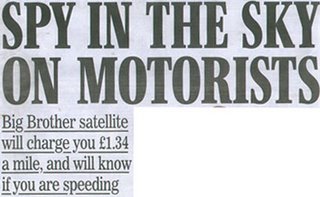
Bursting onto the front page of the Daily Express today is the banner headline (illustrated), "Spy in the sky on motorists" – the paper's "take" on the announcement by the newly appointed transport secretary, Douglas Alexander MP, that he intends to make satellite-based road pricing his "personal priority".
.
The Government's "big idea" for reducing road congestion is to impose a system of variable charging which could force motorists to pay up to £1.34 per mile at peak times, with lower charges – down to 2p per mile – on less frequented roads.
.
Predictably – and understandably – the paper picks up on the "big brother" aspect of the system, noting that the technology could be used to "snoop on the private lives of citizens" – a highly justified fear as the system itself relies on being able to record, very accurately, every journey you make in a car.
.
The technology to implement this latest big brother system will employ the GPS satellite navigation system and this will almost certainly be the EU's Galileo system.
.
The GPS system, in common with the US "Navstar" GPS system, is entirely passive, each satellite in the constellation simply transmitting a time signal. With three or more such signals, a vehicle-mounted receiver unit can translate these data into positional information and tell drives where they are.
.
Now for the sting, for a road pricing system to work the information is processed by what is called an "on board unit" (OBU) which holds personal and vehicle details in its microchip memory. It continually processes satellite signals to work out positioning, integrates those data with the personal details and then transmits that information via an in-built GMS mobile phone to a receiving station. There, the trip details are recorded and charges are calculated.Generally, the user will then then receive a monthly invoice, or cash can be withdrawn directly from users' bank accounts via a dircet debit.
.
To prevent "free riders", there will be a separate, but linked enforcement system. This involves, typically, road gantries with highly sophisticated cameras linked to number plate recognition software.
.
Given the huge number of private vehicles on British roads – approximately 25 million, and the extent of the roadnetwork, our dear Government is setting out to try something, the scale of which has never been attempted before.
Given the huge number of private vehicles on British roads – approximately 25 million, and the extent of the roadnetwork, our dear Government is setting out to try something, the scale of which has never been attempted before.
.
The government track-record on major computer systems is lamentable and the sheer practicalities of getting the scheme up and running are daunting.
.
In order to get public agreement, the Government will no doubt attempt to sugar the pill by promising to lower petrol tax. But, according to the Express, fewer than one percent of drivers actually believe the government would do this. The charges would be yet another tax on motorists. Combine that with the "civil liberties" issue of all journey data being recorded and public hostility is almost guaranteed.















No comments:
Post a Comment